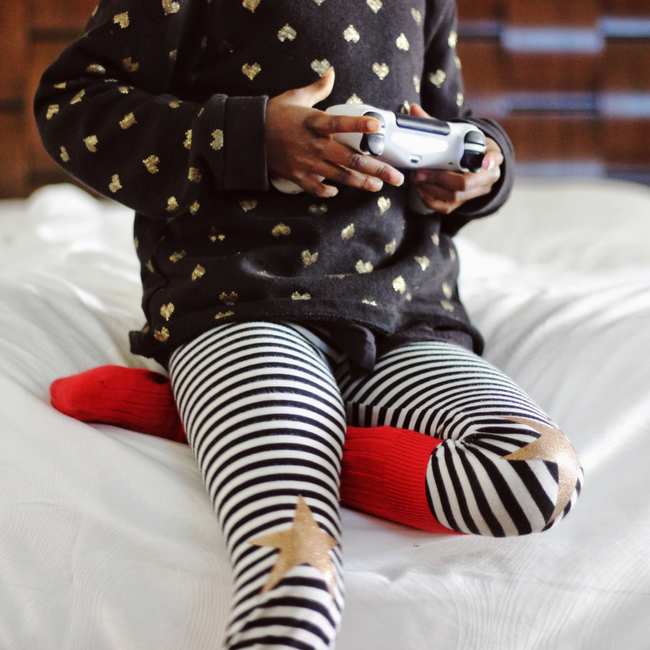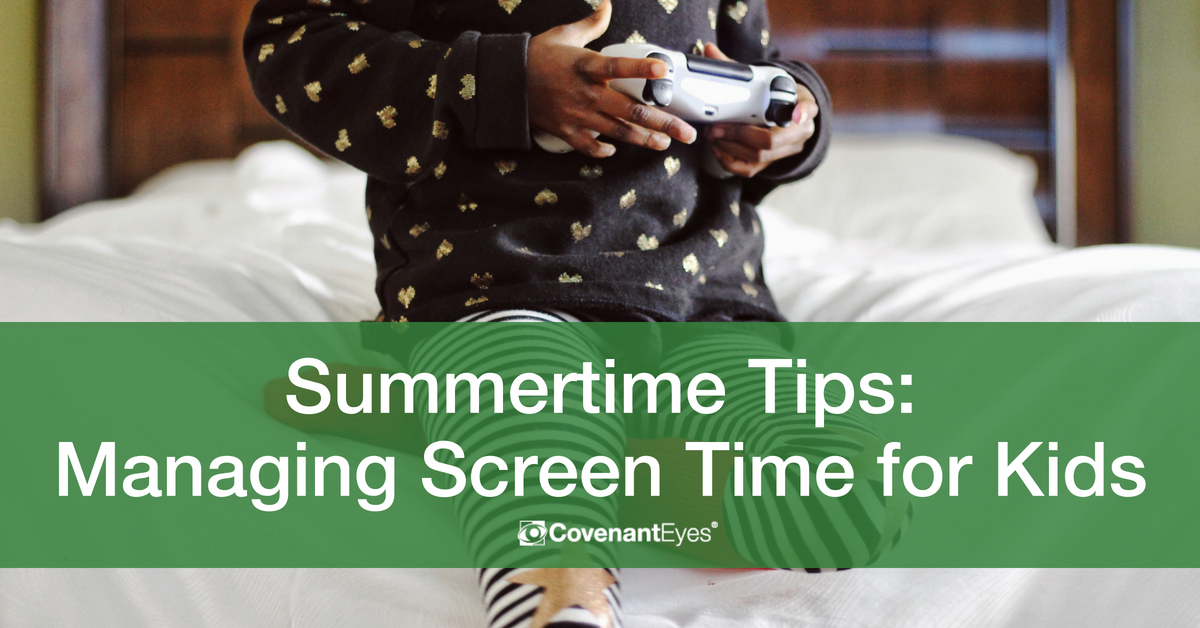Is There a Right Amount of Screen Time for Kids?
Determining the right number of hours for a child to use a digital screen is tough. Parents often ask me, “What’s the right amount of screen time for my child?” I admit that it would be so much easier to parent in the digital age if there was an age and hours chart that I could just point to and say, “This is what the experts say! There’s no arguing!” But, we all know that it’s not that easy. In fact, it’s quite complicated.
In my own home, we have the added complexity of raising a child with Down Syndrome named Grant, who all day at school, uses the LAMP Words for Life App. It’s through this personal iPad mini with this one app (locked in with Guided Access) that Grant is learning how to construct sentences, and in the midst of situations where he doesn’t have the words, he uses the iPad to express himself.
Does this educational interaction with digital screens count toward some mythical screen time limit? What if I told you Grant could watch movies for 10-hours straight if we let him because of a compulsion to watch certain movies? How in the world does this young man begin to understand the difference between good and bad screen time? So, I’m right there with you! Struggling in a world where the ease of a screen makes for a tempting default response in a busy house like ours.
Even Adults Need Help Managing Their Devices!
At their recent developer’s conference, Google announced a new feature for YouTube that can be set to remind you at certain increments to put the app down. Recent dives into Instagram’s yet-to-be-released code updates have uncovered similar functionality for the popular social media platform, with charts showing users daily time usage. There’s a cruel irony in having the very technology we created give us reminders to not use the technology.
Tips for Managing Your Kids’ Screen Time
These tips below were originally shared in a post I wrote at Protect Young Eyes titled, “Screen Time and Kids: 5 Recommendations for Parents and Educators.”
Whether your child is 2 or 12, we believe these principles apply based on what we’re learning from the neuroscience and addiction recovery communities:
1. Less is more when it comes to infant screen time. We don’t know exact answers, but everything is pointing toward keeping screens away from our little ones. A May 2017 study found that 18-month-olds who did not use screens had significantly better language skills than those who used screens.
SANITY CHECK: Hey, stay-at-home-parent, if you need to shove a screen in your kid’s hands just so you can take a shower, we get it. We do it too. Our son Grant has Down Syndrome, and ZERO attention span. Sometimes a screen, in limited doses, is the only way for Andrea to get anything done. No judgment here, but this is the exception and not the norm.
2. Make them go outside and play. A kid who has healthy human connections and healthy hobbies and outlets is less likely to fall into addiction in general. Nothing beats going outside and soaking up the green. We were created in nature and it seems that we learn best in nature. Green spaces. Bugs. Mud. Sunshine on the skin. According to Tim Drake, founder of Primitive Pursuits, a nonprofit nature-based program in New York, “Nature is where we come from. It brought us to where we are today. The reason we’re successful as a species is because of our original relationship with nature. Exposing a child to that touches the hard-wiring of being human—they become ‘activated’” [Glow Kids, page 241].
3. Let them cry it out. When our kids cry or whine in public, and we hand them a screen to quiet them, we are promoting a quick fix mentality to treating their uncomfortable feelings. A flashing screen teaches the still-developing neurology of a 4-year-old that the dopamine rush from mom’s iPhone is the antidote when I’m upset. Screen time becomes the learned solution.
Showing our children how to find other ways to alleviate these emotions will possibly save them in the long run from using unhealthy, quick-fix remedies in emotionally charged situations. Even if you’re the mom with the screaming kid in aisle 10, find another way.
4. Let them see you doing the same. Parents, you need to model the behaviors you want to see in your child. Are you curious to know the amount of time you spend on your device? There’s an app for that!
Bonus Tip for Managing Screen Time for Kids:
Let’s go back to the question I posed at the beginning: What’s the right amount of digital screen time to give your kid? In our home, we answer the question this way. I have two young boys who love Mario Kart and Skylanders. They would play both all day if I let them. When I tell them that it’s time to quit, they know that if they get angry, then there will be a penalty. Here’s our stance:
If it makes you mad when I take it away, then the game will disappear for at least a day.
In other words, I know they’re playing too much if the game elicits undue emotion inside of them. I watch their reactions closely. I invite you to study your kids. Each one is going to be wired a little differently. Manage screen time for your kids accordingly.
Is Your Family Ready for a Digital Detox?
Don’t let summertime turn into screen-time. Covenant Eyes has developed a 7-day Digital Detox made for families just like yours. It’s packed with practical steps parents can take to reclaim life from the screens that so easily consume precious minutes on sunny days.
And if you sign up through June 15, you’ll be entered to win a family fun basket for the summer, which includes your choice of a couple fun yard games and board games (like Ticket to Ride, PieFace, Spike Ball, and more) and some picnic essentials.
Sign up for Digital Detox and Enter Our Summer Giveaway









I have struggled with how much time my teenage daughter spends on her phone. She will spend the majority of a summer day texting her friends and being on Facebook. I talk with her about setting goals and having more focus beyond the phone. She only has two more years left in high school so I would really like to see her develop time management skills on her own without having to always set limits externally. Any advise on how to navigate as a parent the control of screen time with teens who need to start transitioning to adulthood?
If your child is not using their phone in a healthy way, it’s time for you as a parent to intervene. It’s nice to think that kids will figure these things out on their own, but the reality is that we are parents are here to help them learn, and in fact children do not have the full brain development to make good long-term choices for themselves. That’s why they need us while they’re growing up! We set limits while they were children to help them establish a sense of healthy norms. What they do as adults is up to them, but at least they have a set-point about what’s normal, and normal is not non-stop indulgence.
Kids do not have the brain development to make adult decisions about what is healthy in the long-term. Don’t expect that of them. Help them learn what’s healthy by providing limits while they are children. When their brains are fully developed (age 25!!!) then expect more mature behaviors.
Meanwhile, step up with healthy limits.
Kay, I get what you are saying. Let me clear one thing up – we are not afraid to set boundaries or limits with our children. My teenage daughter has monitoring software on her phone, and she does not have most of the apps on her phone that most kids have. For one thing – I want to choose my battles very carefully with a teenager daughter. My struggle is also in having the wisdom to know whether to enforce limits and boundaries on her or to step back and let natural consequences follow to her poor choices. I believe letting a child fail in some cases and face those consequences is a far better teacher than me setting boundaries and limits to prevent poor decisions. For example, if she doesn’t get her chores done because she mismanaged her time on her phone, sorry can’t go hang out with the friends. Or if she failed to make the grades in a class when she seemed to find plenty of time on the phone, then natural consequences will follow. Or if she goes to play sports next year and ends up sitting on the bench because she didn’t practice and put forth effort, then that is a natural consequence of her decisions. I believe if I always control things for my kids and never step back and let them face consequences for poor choices, then I have done a great disservice – especially as she is transitioning to adulthood and within a few years could be living on her own. I hear over and over the importance of letting our kids fail and face the consequences (now there are some areas that I will step in and not let my child fail in like drugs or pornography). This is where I am at right now. Do you disagree with this?
Sounds like you’re doing fine. Just don’t expect your child to be able to manage everything on their own. Keep those conversations open, and don’t be afraid to adjust those boundaries when your child is not managing their internet usage well. That’s simply an indication that they’re not ready for that responsibility yet. Their brain development does not allow for them to have long-term adult views, so don’t expect adult behaviors yet. And even when she’s an adult, she will need support and help along the way too, as all of us do.